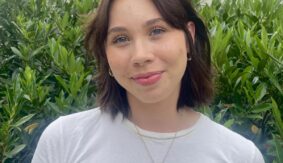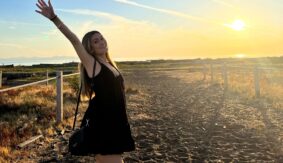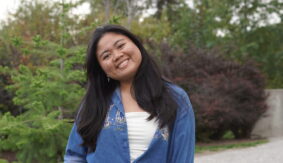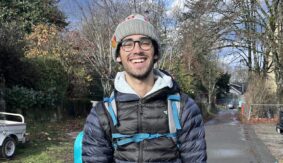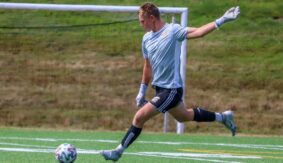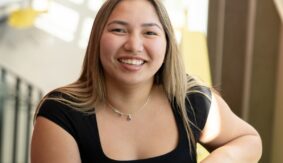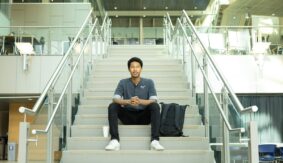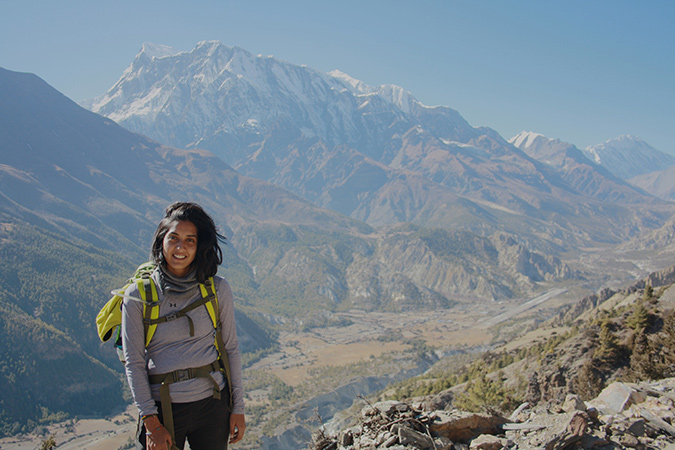
Find out how a UBC degree propelled BSc alumna Sara Amadi on global adventures and a quest to join the fight against climate change
Choosing UBC was an easy decision for Faculty of Land and Food Systems alumna and Ontario native Sara Amadi. She says it was the university’s “fantastic programs, stellar location and, of course, the ocean” that made her take the leap to head out west. But despite being confident in her decision, arriving at university as a first-year student was still an intimidating experience.
“Before arriving at UBC, I was quite nervous about making new friends, finding my way around campus, adjusting to a new city, and learning how to cope with my family on the other side of the country,” Sara says. “But my feelings changed within two weeks of moving into residence. I realized that everyone was just as nervous and confused as I was, so saying hello to strangers definitely broke the ice, and attending campus events with new friends made it easier to meet more people.”
Now, as an alumna, Sara looks back on her time at UBC as the formative years that got her to where she is now: a globe-trotting professional with graduate-degree ambitions and dreams of improving our world through her work with climate change.
How did you find your program, the Bachelor of Science in Global Resource Systems?
I started my academic career in the Faculty of Arts and took a number of general courses. In the summer following first year, I took an introductory biology course on ecology and fell in love with conservation. While in my second year, a friend told me about the Global Resource Systems program in the Faculty of Land and Food Systems.
The program immediately enthralled me: students would specialize in a region and a resource in the world and take courses across different faculties at UBC to build an understanding of their specialization. Its mission is to shape global leaders who are passionate about grassroots movements, protecting natural resources, and having a positive impact in the world.
“The roles that I held on projects in different departments allowed me to develop valuable research skills and gain a better understanding of the academic research process, and gave me the opportunity to learn directly about current issues.” – Sara Amadi, BSc, Global Resource Systems
What at UBC had the biggest impact on your future?
The remarkable network of friends, peers, professors, advisors, and counsellors that I had at UBC has undoubtedly had the most significant impact on my career and future plans.
My recommendations to both incoming and current students is this: visit your professors during office times often; check in with your advisor about courses and career counselling regularly; schedule an appointment with a counsellor when you’re feeling overwhelmed; attend as many campus events as you can possibly handle; hang out at the campus pub and introduce yourself to new people. Doing these things allowed me to build a diverse network on campus, which played a tremendous role in making my time at UBC some of the most transformative years of my life.
What kind of academic opportunities did you take advantage of?
I worked as a research assistant on a number of projects with professors whom I respected as academics and admired as individuals. The roles that I held on projects in different departments allowed me to develop valuable research skills and gain a better understanding of the academic research process, and gave me the opportunity to learn directly about current issues.
Working extensively with Dr. Karen Bakker on a project titled, “Sustainable Water Governance and Indigenous Law,” exposed me to issues surrounding Indigenous water governance in the Canadian context. For me, this experience was pivotal, as it reminded me that human rights violations are not limited to nations with unstable economies, but can exist in our own backyards.
I also supported Dr. Nathan Lauster on a project titled, “Making Housing Home,” which examined the relationship between people’s daily routines in Vancouver, their socio-economic background, and what their meaning of home was.
Prior to this, I had enjoyed taking Dr. Lauster’s class on urban sociology and, subsequently, asked him to supervise my project in a directed studies seminar. This is a self-directed research project that any student can undertake with the supervision of a professor. Instead of designing my own project, he invited me to work on the ongoing Making Housing Home project, which eventually led to a research assistant position when I completed my seminar.
You also went on academic exchange to France – what was that like?
It was one of the most enriching experiences during my degree. It was the first time I had gone abroad on my own and was essentially forced to figure it out as life happened. Looking back, I don’t remember the challenges that I faced in the first few weeks, instead I fondly think back to the incredible people coming from different corners of the world, the exciting weekends spent exploring new European cities, and the invaluable lessons I gained from jumping into the unknown hoping that it would be okay.
Most importantly, the experience made me cognizant of my ability to thrive when taken out of my comfort zone which, in turn, has led me to persistently challenge my limits and to take as many of the opportunities that come my way as possible.
“The confidence that I gained from taking leaps while in university helped me to continue doing so when I entered the real world.”
Can you tell us about your other experiences abroad, in Turkey, Germany, and Nepal?
Each of these experiences ended up teaching me something different. The confidence that I gained from taking leaps while in university helped me to continue doing so when I entered the real world.
One summer, I worked as an English teacher at a primary school in Ankara, Turkey. This past year, in Germany, I was part of the operations team at Tech Open Air, the biggest interdisciplinary technology conference in Europe. My internship in Nepal, with Kathmandu Living Labs, was the most connected to what I studied at UBC. It introduced me to the concepts of open data and open-source technologies and had a great impact on my future plans.
What’s next for you?
Despite having a prior interest in geography and regional planning, my experience in Nepal reaffirmed plans to pursue a Master of Urban Planning, with a focus on climate change adaptation and strengthening resilience – hopefully next year!
Recently, I joined the “Climate Migrants and Refugees Project” as research manager. This is a non-profit founded by a group of students from UBC’s School of Community and Regional Planning. Recognizing the implications that climate change will have on human migrations, the project aims to develop a toolbox and short-term recommendations for different stakeholders to use to effectively resettle future influxes of people displaced by climate-related disruptions. In my role, I am supporting the project by developing its research plan, identifying information gaps in existing literature, and building capacity to understand related issues at different scales.
